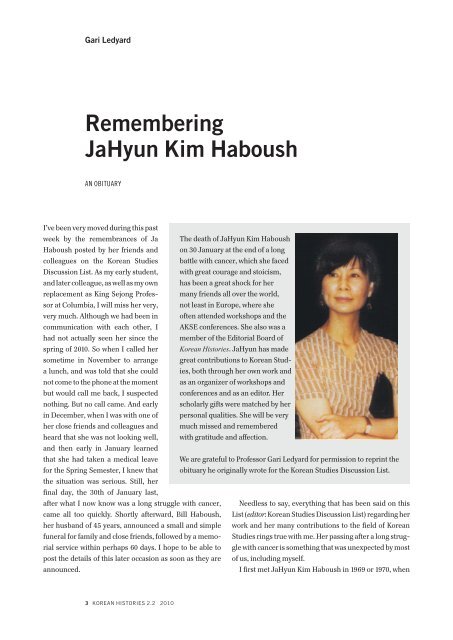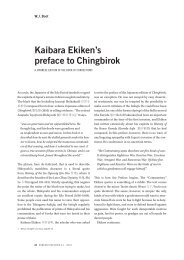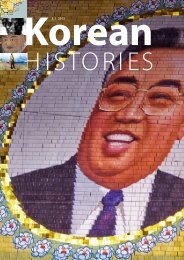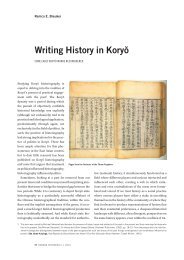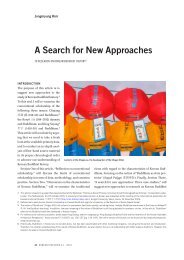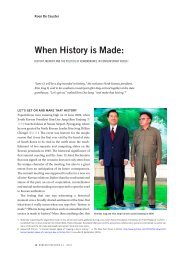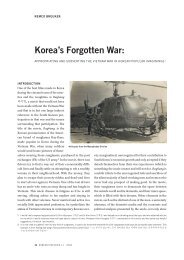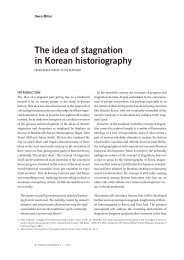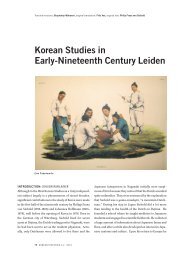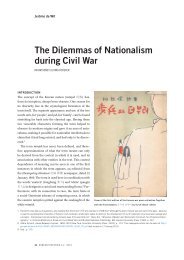Remembering JaHyun Kim Haboush – Gari ... - Korean Histories
Remembering JaHyun Kim Haboush – Gari ... - Korean Histories
Remembering JaHyun Kim Haboush – Gari ... - Korean Histories
You also want an ePaper? Increase the reach of your titles
YUMPU automatically turns print PDFs into web optimized ePapers that Google loves.
<strong>Gari</strong> Ledyard<br />
<strong>Remembering</strong><br />
<strong>JaHyun</strong> <strong>Kim</strong> <strong>Haboush</strong><br />
An Obituary<br />
I’ve been very moved during this past<br />
week by the remembrances of Ja The death of <strong>JaHyun</strong> <strong>Kim</strong> <strong>Haboush</strong><br />
<strong>Haboush</strong> posted by her friends and on 30 January at the end of a long<br />
colleagues on the <strong>Korean</strong> Studies battle with cancer, which she faced<br />
Discussion List. As my early student, with great courage and stoicism,<br />
and later colleague, as well as my own has been a great shock for her<br />
replacement as King Sejong Professor<br />
at Columbia, I will miss her very, not least in Europe, where she<br />
many friends all over the world,<br />
very much. Although we had been in often attended workshops and the<br />
communication with each other, I AKSE conferences. She also was a<br />
had not actually seen her since the member of the Editorial Board of<br />
spring of 2010. So when I called her <strong>Korean</strong> <strong>Histories</strong>. <strong>JaHyun</strong> has made<br />
sometime in November to arrange great contributions to <strong>Korean</strong> Studies,<br />
both through her own work and<br />
a lunch, and was told that she could<br />
not come to the phone at the moment as an organizer of workshops and<br />
but would call me back, I suspected conferences and as an editor. Her<br />
nothing. But no call came. And early scholarly gifts were matched by her<br />
in December, when I was with one of personal qualities. She will be very<br />
her close friends and colleagues and much missed and remembered<br />
heard that she was not looking well, with gratitude and affection.<br />
and then early in January learned<br />
that she had taken a medical leave We are grateful to Professor <strong>Gari</strong> Ledyard for permission to reprint the<br />
for the Spring Semester, I knew that obituary he originally wrote for the <strong>Korean</strong> Studies Discussion List.<br />
the situation was serious. Still, her<br />
final day, the 30th of January last,<br />
after what I now know was a long struggle with cancer, Needless to say, everything that has been said on this<br />
came all too quickly. Shortly afterward, Bill <strong>Haboush</strong>, List (editor: <strong>Korean</strong> Studies Discussion List) regarding her<br />
her husband of 45 years, announced a small and simple work and her many contributions to the field of <strong>Korean</strong><br />
funeral for family and close friends, followed by a memorial<br />
service within perhaps 60 days. I hope to be able to gle with cancer is something that was unexpected by most<br />
Studies rings true with me. Her passing after a long strug-<br />
post the details of this later occasion as soon as they are of us, including myself.<br />
announced.<br />
I first met <strong>JaHyun</strong> <strong>Kim</strong> <strong>Haboush</strong> in 1969 or 1970, when<br />
3 <strong>Korean</strong> <strong>Histories</strong> 2.2 2010
<strong>Gari</strong> Ledyard <strong>Remembering</strong> <strong>JaHyun</strong> <strong>Kim</strong> <strong>Haboush</strong><br />
she appeared at my office door and inquired about the<br />
possibility of admission to the graduate program at<br />
Columbia. It became quickly apparent that she would be<br />
an ideal student. She had graduated from Ewha University<br />
in 1962, majoring in English literature. In 1970, she<br />
earned an M.A. at the University of Michigan in Chinese<br />
literature, with her M.A. thesis on Yuan Dynasty theater.<br />
Her abilities in Chinese were already outstanding. At<br />
Columbia she discovered King Yŏngjo, a monarch with<br />
issues if ever there was one, and she was off and running<br />
on her PhD topic, which led to her second book, A<br />
Heritage of Kings. From that time on, she was never without<br />
a project. She loved talking about her work and the<br />
discoveries she made. A lunch with her was always fun<br />
and full of back-and-forth on her current interests and<br />
the state of the <strong>Korean</strong> history field. She enjoyed every<br />
minute she could spend in the sillok and in the numerous<br />
other Chosŏn dynasty sources that she marched through.<br />
Most of them were in Chinese—and this was before many<br />
of those sources had been translated into <strong>Korean</strong>. There<br />
could hardly be a better role model for today’s younger<br />
scholars working in the Chosŏn period, or a better inspiration<br />
for other scholars to seriously consider the premodern<br />
periods for their life’s work. Such a career is not<br />
for everyone, but as Ja has shown, there was a lot of interesting<br />
<strong>Korean</strong> life long before modernity.<br />
Ja’s work was mainly devoted to the Chosŏn dynasty,<br />
and particularly the second half of it for which materials<br />
on popular culture were more numerous. She also made<br />
many contributions on Confucianism in the Chosŏn<br />
period. She saw Confucianism as a major institution that<br />
provided both background and foil for the understanding<br />
of Chosŏn’s rich and varied cultural levels. Her writings<br />
offered many different approaches to these subjects, as<br />
is evident in her books, articles, and reviews. Her career<br />
was also marked by energetic activity in organizing conferences<br />
and cooperative volumes. It seemed that the<br />
more people she brought together for joint efforts, the<br />
happier she was. She played a major role in establishing<br />
<strong>Korean</strong> Studies on a sound basis at the University of<br />
Illinois (Champaign), and made equally important contributions<br />
to the Columbia program after my retirement<br />
in 2000. She was a superb translator, from major projects<br />
such as The Memoirs of Lady Hyegyŏng to short articles for<br />
encyclopedias and textbooks. For Hyegyŏng she received<br />
the Grand Prize in Literature Translation from the <strong>Korean</strong><br />
Culture and Arts Foundation in 1997. Her books and articles<br />
appear on syllabuses in Asian Studies all over the<br />
world. A book that to our great loss we will never see is The<br />
Great East Asian War and the Birth of the <strong>Korean</strong> Nation,<br />
which Ja mentioned as the tentative title of a book she<br />
was writing in her activity report in the Spring of 2010. She<br />
never mentioned this project to me, but I feel confident<br />
that the title must reflect the Imjin Wars of 1592-1598,<br />
involving Korea, China, and Japan, and the resulting consolidation<br />
of a more integrated <strong>Korean</strong> society that produced<br />
a multi-leveled <strong>Korean</strong> culture, unlike the exclusively<br />
aristocratic, China-driven culture that had driven<br />
Korea’s historiography prior to Imjin. I know that she<br />
often spoke of the broad use of the written <strong>Korean</strong> vernacular<br />
during that period, and had done much research<br />
along those lines. Her latest book, Epistolary Korea, has<br />
many Imjin references.<br />
Ja was also known for the help and encouragement<br />
she gave to her students. Recent communications from<br />
some of them provide heartfelt testimony to this. One,<br />
from a young woman specializing in Chinese literature<br />
but who wished to broaden her perspective by exploring<br />
<strong>Korean</strong> Studies, expressed her grief over the news,<br />
saying, “I have no doubt that her many other students<br />
will also feel their sense of loss while remembering her<br />
as an enduring inspiration. My heart goes to her family,<br />
friends, colleagues, and other students.” Another, who<br />
was a Columbia student and later a collaborator in some<br />
of Ja’s projects, writes, “I thought of calling her when I<br />
was in New York to use the library, but did not. I never<br />
expressed my thanks to her, and I regret that.” Indeed, Ja<br />
left too quickly and we are all too late.<br />
Through the cooperation of the Department of East<br />
Asian Languages and Cultures at Columbia University,<br />
I am able to add to these thoughts a complete list of her<br />
writings as of last year, which in speaking for themselves<br />
will obviate any need to characterize her entire oeuvre.<br />
An updated listing of her published writings was submitted<br />
to the Department sometime during 2010. That list is<br />
reproduced below.<br />
First posted on the <strong>Korean</strong> Studies Discussion List 5 February<br />
2011<br />
Expanded and re-edited 16 February 2011<br />
4 <strong>Korean</strong> <strong>Histories</strong> 2.2 2010
<strong>Gari</strong> Ledyard <strong>Remembering</strong> <strong>JaHyun</strong> <strong>Kim</strong> <strong>Haboush</strong><br />
Publications of <strong>JaHyun</strong> <strong>Kim</strong> <strong>Haboush</strong><br />
Books:<br />
1985 The Rise of Neo-Confucianism in Korea. Coeditor.<br />
New York: Columbia University Press.<br />
1988 A Heritage of Kings: One Man’s Monarchy in the Confucian<br />
World. New York: Columbia University Press.<br />
1996 The Memoirs of Lady Hyegyŏng: The Autobiographical<br />
Writings of A Crown Princess of Eighteenth-Century<br />
Korea. Berkeley: University of California Press.<br />
1999 Culture and the State in Late Chosŏn Korea. Co-editor.<br />
Asia Center, Harvard University.<br />
2001 The Confucian Kingship in Korea (a paper edition of<br />
A Heritage of Kings with an added preface). New York:<br />
Columbia University Press.<br />
2003 Women and Confucian Cultures in Pre-modern<br />
China, Korea, and Japan.<br />
Co-editor. Berkeley: University of California Press.<br />
2009 Epistolary Korea: Letters from the Communicative<br />
Space of the Chosôn, 1392-1910. New York: Columbia<br />
University Press.<br />
Articles:<br />
1985 “The Education of the Yi Crown Prince: A Study<br />
in Confucian Pedagogy.” In Wm. Theodore Bary<br />
and <strong>Haboush</strong>, eds. The Rise of Neo-Confucianism in<br />
Korea. pp. 161-222.<br />
1985 “Confucian Rhetoric and Ritual as Techniques<br />
of Political Dominance: Yŏngjo’s Use of the Royal<br />
Lecture.”The Journal of <strong>Korean</strong> Studies 5:39-61.<br />
1987 “The Sirhak Movement of the Late Yi Dynasty.”<br />
<strong>Korean</strong> Culture 8.2: 20-27.<br />
1987 “Confucianism in Korea.” In Mircea Eliade ed. The<br />
Encyclopedia of Religion. 16 Vols. New York: MacMillan<br />
and Free Press. 4:10-15.<br />
1987 “Song Siyŏl,” “Yi T’oegye,” “Yi Yulgok,” “Yun Hyu.”<br />
In Mircea Eliade ed. The Encyclopedia of Religion.<br />
13;415-16; 15:517-18; 15:518-19; 15:543-44.<br />
1988 “Tonghak,” “<strong>Kim</strong> Ok-kyun,” “Son Pyŏng-hŭi.” In<br />
Ainslie T. Embree ed. The Encyclopedia of Asian History<br />
. 4 Vols. New York: Charles Scribner’s Sons.<br />
1991 “The Confucianization of <strong>Korean</strong> Society.” In<br />
Gilbert Rozman ed. The East Asian Region: Confucian<br />
Traditions and Modern Dynamism. Princeton: Princeton<br />
University Press. pp. 84-110.<br />
1991 “Women in Traditional Korea.” In Helen Tierney<br />
ed. Women’s Studies Encyclopedia. 3 Vols. New York:<br />
Greenwood.<br />
1992 “Dual Nature of Cultural Discourse in Chosŏn<br />
Korea.” In Bernard Hung-Kay Luk, ed., Contact<br />
between Cultures, East Asia: History and Social Science.<br />
Lampeter, Dyfed, UK: Edwin Mellen Press. Vol. 4,<br />
pp. 194-96.<br />
1992 “The Text of The Memoirs of Lady Hyegyŏng: The<br />
Problem of Authenticity.” Gest Library Journal 5.2:<br />
29-48.<br />
1993 “Perceptions of <strong>Korean</strong> Culture in the United<br />
States.” Korea Focus 1.2: 72-86. Translated as:<br />
1993 “미국내의 한국 문화: 그 존재와 인식. (Representation<br />
and Perception of <strong>Korean</strong> Culture in the United<br />
States). Kyegan Sasang. March. pp. 149-175.<br />
1993 “Public and Private in the Court Art of Eighteenth-<br />
Century Korea.” <strong>Korean</strong> Culture 14.2: 14-21.<br />
1993 “Rescoring the Universal in a <strong>Korean</strong> Mode: Eighteenth<br />
Century <strong>Korean</strong> Culture.” <strong>Korean</strong> Arts of the<br />
Eighteenth Century: Splendor and Simplicity.New York:<br />
The Asia Society Galleries. pp. 23-33.<br />
1993 “The Censorial Voice in Chosŏn Korea: A Tradition<br />
of Institutionalized Dissent.” Han-kuo hsueh-bao<br />
12:11-19.<br />
1994 “Academies and Civil Society in Chosŏn Korea.” In<br />
Léon Vandermeersch ed. La société civile face à l’État:<br />
dans les traditions chinoise, japonaise, coréenne et vietnamienne.<br />
Paris: École Française d’Extrême-Orient.<br />
pp. 383-392.<br />
1995 “Dreamland: <strong>Korean</strong> Dreamscapes as an Alternative<br />
Confucian Space.” In Helwig Schmidt-Glintzer<br />
ed. Das Andere China. Wiesbaden, Germany:<br />
Harrassowitz. pp. 659-70.<br />
1995 “Filial Emotions and Filial Values: Changing Patterns<br />
in the Discourse of Filiality in Late Chosŏn<br />
Korea.” Harvard Journal of Asiatic Studies 55.1: 129-177.<br />
1997 “시공을 넘나든 만남” (Encounter beyond space and<br />
time) in Readers’ Today (Dec 1997): 22-25.<br />
1999 “Constructing the Center: The Ritual Controversy<br />
and the Search for a New Identity in Seventeenth-<br />
Century Korea,” in <strong>JaHyun</strong> <strong>Kim</strong> <strong>Haboush</strong> and Martina<br />
Deuchler, eds., Culture and the State in Late Chosôn<br />
Korea. Cambridge: Asia Center, Harvard University,<br />
pp. 46-90, 240-49.<br />
2001 “In Search of HISTORY in Democratic Korea: The<br />
Discourse of Modernity in Contemporary Historical<br />
Fiction.” In Constructing Nationhood in Modern East<br />
Asia, Kai-wing Chow, Kevin Doak, Poshek Fu, ed. Ann<br />
Arbor: University of Michigan Press, pp. 189-214.<br />
2002 “Gender and the Politics of Language in Korea” in<br />
5 <strong>Korean</strong> <strong>Histories</strong> 2.2 2010
<strong>Gari</strong> Ledyard <strong>Remembering</strong> <strong>JaHyun</strong> <strong>Kim</strong> <strong>Haboush</strong><br />
Rethinking Confucianism: Past & Present in China,<br />
Japan, Korea, and Vietnam, John Duncan, Benjamin<br />
Elman and Herman Ooms, ed. Asian Pacific Monograph<br />
Series, UCLA, pp. 220-257.<br />
2003 “Versions and Subversions: Patriarchy and Polygamy<br />
in the Vernacular Narratives of Chosŏn Korea.” In<br />
Women and Confucian Cultures in Pre-Modern China,<br />
Korea, and Japan. Dorothy Ko, <strong>JaHyun</strong> <strong>Kim</strong> <strong>Haboush</strong>,<br />
Joan Piggot, ed. Berkeley: University of California<br />
Press, pp. 279-312.<br />
2003 “Dead Bodies in the Postwar Discourse of Identity<br />
in Seventeenth-Century Korea: Subversion and<br />
Literary Production in the Private Sector.” The Journal<br />
of Asian Studies. 62.2 (May 2003): 415-442. “Private<br />
Memory and Public History.” In Creative Women of<br />
Korea. Young-Key <strong>Kim</strong>-Renaud ed. Armonk, NY: M. E.<br />
Sharpe, pp. 122-141.<br />
2003 “Conference on Historiography of Korea—Methodologies<br />
and Strategies” in 한국사학회 ed., 한국사 연구<br />
방법의 새로운 모색. Seoul: Kyôngin munhwasa,2003,<br />
1-8.<br />
“조선시대 문화사를 어떻게 쓸 것인가 — 자료와 접<br />
근 방법에 대하여” (How to write the cultural history<br />
of Chosŏn Korea— sources and approaches) in<br />
Han’guksa sahakhoe ed., Han’guksa yŏn’gu pangbŏp<br />
ŭi saeroun mosaek. Seoul: Kyŏngin munhwasa, 2003,<br />
173-196.<br />
2004 “Filial Emotions and Filial Values: Changing Patterns<br />
in the Discourse of Filiality in Late Chosŏn<br />
Korea.” Reprinted in John Corrigan ed., Religion<br />
and Emotion: Approaches and Interpretations. Oxford:<br />
Oxford University Press, 75-113.<br />
2005 “Contesting Chinese Time, Nationalizing Temporal<br />
Space: Temporal Inscription in Late Chosŏn Korea.”<br />
In Lynn Struve, ed., Time, Temporality, and Imperial<br />
Transition . Honolulu: University of Hawaii, 115-141.<br />
2005 “효의 감성과 효의 가치: 조선 후기 효 담논의 변<br />
화” (Discourse on Filiality during late Chosŏn Korea),<br />
Kungmunhak yŏn’gu (June, 2005): 155-203.<br />
2006 “Introduction,” in Hahn Moo-Sook, And so flows<br />
History, Young-Key <strong>Kim</strong>-Renaud, tr., Honolulu: University<br />
of Hawaii Press, 2006, pp/1-7<br />
2007 “우리는 왜 임진왜란을 연구합니까?” (Why do we<br />
study the Imjin Wars?) 임진왜란: 동아세아 삼국 전<br />
쟁」 Seoul: Humanist Books, 2007, pp. 23-39.<br />
2008 “The Vanished Women of Korea: The Anonymity<br />
of Texts and the Historicity of Subjects.” In Anne<br />
Walthall ed., Servants of the Dynasty. Berkeley: University<br />
of California Press.<br />
2010 “Yun Hyu and the Search for Dominance: A Seventeenth-Century<br />
<strong>Korean</strong> Reading of the Offices of Zhou<br />
and the Rituals of Zhou.” In Benjamin Elman and<br />
Martin Kern, eds, Statecraft and Classical Learning:<br />
The Rituals of Zhou and East Asian History. Leiden:<br />
Brill, 2010. 309-329.<br />
Scholarly Translations:<br />
1996 “King Yŏngjo: Eliminating Factions,” “Lady<br />
Hyegyŏng: Two New Factions,” “Literature, Music,<br />
Song,” “Chŏng Naegyo: Preface to Ch’ŏnggu yŏngŏn—<br />
The emergence of the chungin patronage of art.” In<br />
Peter Lee, ed. Sourcebook of <strong>Korean</strong> Civilization: From<br />
the Seventeenth Century to the Present. New York:<br />
Columbia University Press. pp. 39-43, 240-42.<br />
2001 Chapter on Education in Sources of <strong>Korean</strong> Tradition.<br />
Vol. 2. New York: Columbia University Press. pp.<br />
34-69.<br />
Reviews:<br />
1988 Review of Unforgettable Things: Poems by Sŏ<br />
Chŏngju. Translated by David McCann. The Journal of<br />
Asian Studies 47.3: 667-68.<br />
1989 Review of Tongsŏ munhwa kyoryusa yŏn’gu—Myŏng<br />
Ch’ŏng sidae sŏhak suyong (A study of East-West<br />
cultural contact: The reception of Western Learning in<br />
the Ming-Qing period). By Ch’oe Soja. The Journal of<br />
Asian Studies 48: 130-31.<br />
1989 Review of The Life and Hard Times of a <strong>Korean</strong><br />
Shaman: Of Tales and the Telling of Tales. By Laurel<br />
Kendall. <strong>Korean</strong> Studies. 13: 146-50.<br />
1991 Review of Modern <strong>Korean</strong> Literature: An Anthology.<br />
Edited by Peter H. Lee. The Journal of Asian Studies<br />
50.3.<br />
1991 Review of Pine River and Lone Peak: An Anthology<br />
of Three Chosŏn Dynasty Poets. Translated, with<br />
an introduction, by Peter H. Lee. The Journal of Asian<br />
Studies 50.4<br />
1994 Review of Sourcebook of <strong>Korean</strong> Civilization: Early<br />
Times to the Sixteenth Century. Vol. 1. Edited by Peter<br />
H. Lee. The Journal of Asian Studies 53.1: 242-44.<br />
1995 Review of Briefing 1993, Briefing 1994. Edited by<br />
Donald N. Clark. <strong>Korean</strong> Studies 19: 183-86.<br />
2001 Review of My very last possession and Other Stories<br />
by Pak Wansŏ The Journal of Asian Studies.<br />
6 <strong>Korean</strong> <strong>Histories</strong> 2.2 2010


